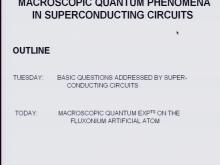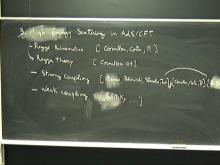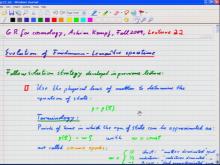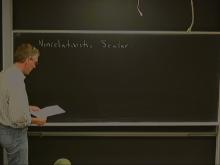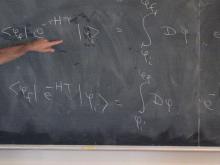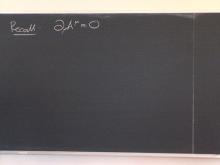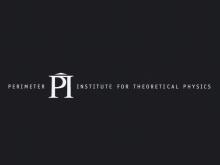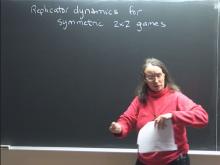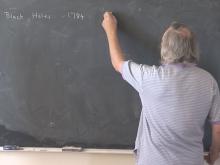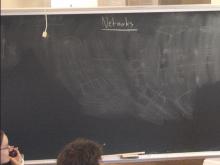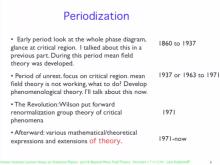Format results
-
23 talksCollection NumberC10003
Talk
-
Foundations and Interpretation of Quantum Theory
23 talksCollection NumberC10002Talk
-

Foundations and Interpretation of Quantum Theory - Lecture 1
Joseph Emerson Institute for Quantum Computing (IQC)
PIRSA:10010068 -

Foundations and Interpretation of Quantum Theory - Lecture 2
Joseph Emerson Institute for Quantum Computing (IQC)
PIRSA:10010079 -

Foundations and Interpretation of Quantum Theory - Lecture 3
Joseph Emerson Institute for Quantum Computing (IQC)
PIRSA:10010069 -

Foundations and Interpretation of Quantum Theory - Lecture 4
Joseph Emerson Institute for Quantum Computing (IQC)
PIRSA:10010070 -

Foundations and Interpretation of Quantum Theory - Lecture 5
Joseph Emerson Institute for Quantum Computing (IQC)
PIRSA:10010081 -

Foundations and Interpretation of Quantum Theory - Lecture 6 (Part 1 of 2)
Robin Blume-Kohout Sandia National Laboratories
PIRSA:10020010 -

Foundations and Interpretation of Quantum Theory - Lecture 6 (Part 2 of 2)
Robin Blume-Kohout Sandia National Laboratories
PIRSA:10020081 -

Foundations and Interpretation of Quantum Theory - Lecture 7A
Robin Blume-Kohout Sandia National Laboratories
PIRSA:10020028
-
-
Scattering in AdS and CFT correlation functions
3 talksCollection NumberC09023Talk
-

High energy scattering
Joao Penedones L'Ecole Polytechnique Federale de Lausanne (EPFL)
PIRSA:09110029 -

-

-
-
General Relativity for Cosmology
20 talksCollection NumberC09019Talk
-
Introduction to Effective Field Theory
21 talksCollection NumberC09020Talk
-

Introduction to Effective Field Theory - Lecture 1A
Cliff Burgess McMaster University
PIRSA:09090016 -

Introduction to Effective Field Theory - Lecture 2A
Cliff Burgess McMaster University
PIRSA:09090017 -

Introduction to Effective Field Theory - Lecture 2B
Cliff Burgess McMaster University
PIRSA:09090021 -

Introduction to Effective Field Theory - Lecture 3A
Cliff Burgess McMaster University
PIRSA:09100050 -

Introduction to Effective Field Theory - Lecture 3B
Cliff Burgess McMaster University
PIRSA:09100054 -

Introduction to Effective Field Theory - Lecture 4A
Cliff Burgess McMaster University
PIRSA:09100051 -

Introduction to Effective Field Theory - Lecture 4B
Cliff Burgess McMaster University
PIRSA:09100154 -

Introduction to Effective Field Theory - Lecture 5A
Cliff Burgess McMaster University
PIRSA:09100052
-
-
09/10 PSI - Research Skills
12 talksCollection NumberC09028Talk
-

PSI Course - Welcome
-
John Berlinsky McMaster University
-
Kari Dalnoki-Veress McMaster University
PIRSA:09080034 -
-

-

-

-

-

-

-

-
-
09/10 PSI - Quantum Field Theory
14 talksCollection NumberC09033Talk
-
09/10 PSI - Mathematical Physics
10 talksCollection NumberC09038Talk
-

Mathematical Physics (PHYS 624) - Lecture 1
Carl Bender Washington University in St. Louis
PIRSA:09110093 -

Mathematical Physics (PHYS 624) - Lecture 2
Carl Bender Washington University in St. Louis
PIRSA:09110094 -

Mathematical Physics (PHYS 624) - Lecture 3
Carl Bender Washington University in St. Louis
PIRSA:09110095 -

Mathematical Physics (PHYS 624) - Lecture 4
Carl Bender Washington University in St. Louis
PIRSA:09110096 -

Mathematical Physics (PHYS 624) - Lecture 5
Carl Bender Washington University in St. Louis
PIRSA:09110097 -

Mathematical Physics (PHYS 624) - Lecture 6
Carl Bender Washington University in St. Louis
PIRSA:09110100 -

Mathematical Physics (PHYS 624) - Lecture 7
Carl Bender Washington University in St. Louis
PIRSA:09110101 -

Mathematical Physics (PHYS 624) - Lecture 8
Carl Bender Washington University in St. Louis
PIRSA:09110102
-
-
09/10 PSI - Dynamical Systems (Review)
15 talksCollection NumberC09043Talk
-

Dynamical Systems - Review (PHYS 607) - Lecture 1
Susan Coppersmith University of Wisconsin–Madison
PIRSA:10010011 -

Dynamical Systems - Review (PHYS 607) - Lecture 2
Susan Coppersmith University of Wisconsin–Madison
PIRSA:10010012 -

Dynamical Systems - Review (PHYS 607) - Lecture 3
Susan Coppersmith University of Wisconsin–Madison
PIRSA:10010013 -

Dynamical Systems - Review (PHYS 607) - Lecture 4
Susan Coppersmith University of Wisconsin–Madison
PIRSA:10010014 -

Dynamical Systems - Review (PHYS 607) - Lecture 5
Susan Coppersmith University of Wisconsin–Madison
PIRSA:10010015 -

Dynamical Systems - Review (PHYS 607) - Lecture 6
Susan Coppersmith University of Wisconsin–Madison
PIRSA:10010018 -

Dynamical Systems - Review (PHYS 607) - Lecture 7
Susan Coppersmith University of Wisconsin–Madison
PIRSA:10010019 -

Dynamical Systems - Review (PHYS 607) - Lecture 8
Susan Coppersmith University of Wisconsin–Madison
PIRSA:10010020
-
-
09/10 PSI - Quantum Theory
16 talksCollection NumberC09032Talk
-
09/10 PSI - Non-Equilibrium Systems
10 talksCollection NumberC09037Talk
-

Non-Equilibrium Systems (PHYS 606) - Lecture 1
Sidney Redner Boston University - Department of Physics
PIRSA:09110105 -

Non-Equilibrium Systems (PHYS 606) - Lecture 2
Sidney Redner Boston University - Department of Physics
PIRSA:09110106 -

Non-Equilibrium Systems (PHYS 606) - Lecture 3
Sidney Redner Boston University - Department of Physics
PIRSA:09110107 -

Non-Equilibrium Systems (PHYS 606) - Lecture 4
Sidney Redner Boston University - Department of Physics
PIRSA:09110108 -

Non-Equilibrium Systems (PHYS 606) - Lecture 5
Sidney Redner Boston University - Department of Physics
PIRSA:09110109 -

Non-Equilibrium Systems (PHYS 606) - Lecture 6
Sidney Redner Boston University - Department of Physics
PIRSA:09110112 -

Non-Equilibrium Systems (PHYS 606) - Lecture 7
Sidney Redner Boston University - Department of Physics
PIRSA:09110113 -

Non-Equilibrium Systems (PHYS 606) - Lecture 8
Sidney Redner Boston University - Department of Physics
PIRSA:09110114
-
-
09/10 PSI - Statistical Mechanics
14 talksCollection NumberC09034Talk
-
Quantum Field Theory for Cosmology
23 talksCollection NumberC10003This course begins with a thorough introduction to quantum field theory. Unlike the usual quantum field theory courses which aim at applications to particle physics, this course then focuses on those quantum field theoretic techniques that are important in the presence of gravity. In particular, this course introduces the properties of quantum fluctuations of fields and how they are affected by curvature and by gravitational horizons. We will cover the highly successful inflationary explanation of the fluctuation spectrum of the cosmic microwave background - and therefore the modern understanding of the quantum origin of all inhomogeneities in the universe (see these amazing visualizations from the data of the Sloan Digital Sky Survey. They display the inhomogeneous distribution of galaxies several billion light years into the universe. Organizer: Achim Kempf -
Foundations and Interpretation of Quantum Theory
23 talksCollection NumberC10002After a review of the axiomatic formulation of quantum theory, the generalized operational structure of the theory will be introduced (including POVM measurements, sequential measurements, and CP maps). There will be an introduction to the orthodox (sometimes called Copenhagen) interpretation of quantum mechanics and the historical problems/issues/debates regarding that interpretation, in particular, the measurement problem and the EPR paradox, and a discussion of contemporary views on these topics. The majority of the course lectures will consist of guest lectures from international experts covering the various approaches to the interpretation of quantum theory (in particular, many-worlds, de Broglie-Bohm, consistent/decoherent histories, and statistical/epistemic interpretations, as time permits) and fundamental properties and tests of quantum theory (such as entanglement and experimental tests of Bell inequalities, contextuality, macroscopic quantum phenomena, and the problem of quantum gravity, as time permits). Organizers: Raymond Laflamme and Joseph Emerson -
Scattering in AdS and CFT correlation functions
3 talksCollection NumberC09023Non credit PI mini-course -
General Relativity for Cosmology
20 talksCollection NumberC09019This course begins by introducing the differential geometry of Lorentzian manifolds from scratch and then builds up quickly to the advanced framework in terms of differential forms and the vielbein formalism. These methods are then used to define general relativity, also as a gauge theory. We then study some of general relativity's deeper properties, such as the formalism of spinors, and aspects of the causal structure and singularities. One key goal is to lay the foundations for students who wish to proceed to studies in quantum gravity. We then apply general relativity to cosmological models and to cosmological perturbation theory. Thereby, we are covering the theory of cosmic inflation which is very successful in predicting, in particular, the properties cosmic microwave background radiation. -
Introduction to Effective Field Theory
21 talksCollection NumberC09020 -
-
-
-
-
-
-









